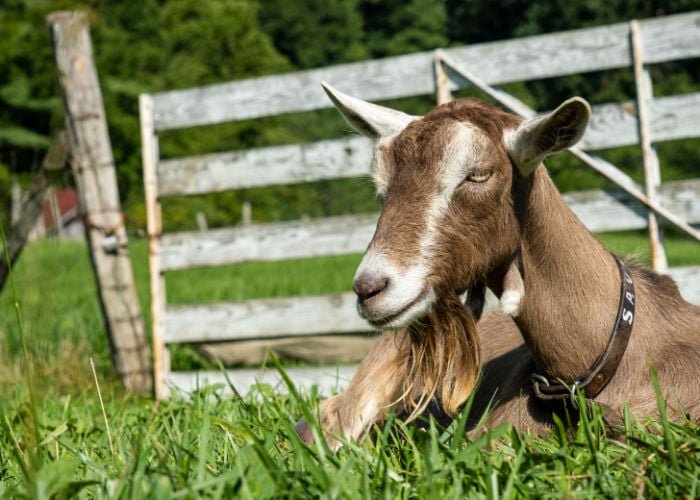
Understanding the common health issues that can affect your Toggenburg goats is crucial for their well-being. From respiratory diseases to nutritional deficiencies, being informed is key. Let’s dive into some of the most common health challenges these goats might face and explore practical prevention tips that will help keep them healthy and happy.
Respiratory Problems in Toggenburg Goats
One of the more common health issues in Toggenburg goats is respiratory diseases. Just like humans, goats can catch colds and develop more serious conditions like pneumonia. These problems often arise due to a combination of stress, poor ventilation in their living spaces, and exposure to harsh weather conditions. If you notice your goat coughing, having difficulty breathing, or showing a lack of energy, it’s important to take action.
To prevent these respiratory issues, ensure that your goats have plenty of fresh air. Check their shelters to see if there’s adequate ventilation. You don’t want to create a draft, but a little airflow can go a long way. Regularly cleaning their living area will also help reduce the buildup of dust and mold, which can trigger respiratory problems. Oh, and remember: Stress can weaken a goat’s immune system, so keeping their environment calm and secure is essential.
Another good practice is to monitor the temperature and humidity levels in their barn. Using a hygrometer can give you peace of mind. If it’s too warm and stuffy, it might be time to open some windows.
Nutritional Deficiencies
Just as humans need a balanced diet to feel their best, Toggenburg goats do too! Nutritional deficiencies can lead to several health issues, from weak bones to poor milk production. Key nutrients that goats need include vitamins A, D, and E, along with calcium and phosphorus for strong skeletal growth. You might be wondering, how can I make sure my goats are getting enough of these nutrients?
Start by providing a well-rounded diet that includes high-quality hay, grains, and minerals specifically formulated for goats. You can also supplement their feed with fruits and vegetables, but be cautious about which ones you offer. Some, like garlic and potatoes, can be harmful to goats.
Regularly consult with a veterinarian to assess your goats’ diet and adjust it as necessary. A simple blood test can reveal if your goats are lacking in any essential vitamins or minerals, allowing you to correct deficiencies before they become serious health issues.
Foot Problems
Foot problems are somewhat common among Toggenburg goats, mainly due to their unique hooves. Problems like laminitis or foot rot can arise, especially if the goat’s living conditions are muddy or unsanitary. These conditions can lead to discomfort and mobility issues, which is a big deal for such active animals.
One of the best ways to prevent foot problems is regular hoof trimming. It’s crucial to keep their hooves clean and well-maintained. Aim to check and trim their hooves at least every six to eight weeks. A good rule of thumb is to look for overgrowth or cracks, which can signal that it’s time for a trim.
Also, make sure your goats have a dry area to roam. If their pen easily collects water, consider elevating the ground with gravel or using mats. This way, their hooves won’t sit in wet conditions that breed bacteria.
Internal Parasites
Internal parasites, particularly worms, can wreak havoc on Toggenburg goats. These tiny foes can rob goats of essential nutrients, leading to weight loss and lethargy. You might not even notice your goats are struggling until they show significant signs of distress. It’s like an unseen battle going on inside them!
To combat these pesky intruders, regular deworming is vital. Your vet can recommend a schedule based on your goats’ specific needs. Monitoring their body condition and looking for signs like a rough coat or slight swelling in the belly can be indicators that it’s time to check for parasites.
Additionally, rotating their grazing areas can help prevent the buildup of parasites in the soil. If you have land to spare, letting them eat in different pastures can disrupt the lifecycle of many internal parasites.
Heat Stress
Goats naturally thrive in cooler climates, so heat stress can be a serious issue for Toggenburgs, especially in warmer months. You might notice your goats acting lethargic, panting excessively, or seeking shade more than usual. It’s essential to be proactive about keeping them cool to prevent heat-related illnesses.
Providing ample shade is the first step. Whether it’s natural from trees or man-made structures, goats appreciate a cool spot to retreat to during hot days. Keeping them hydrated is equally important. Ensure there are always fresh, clean water sources available. You can even add ice to their water during particularly hot days—trust me, they’ll love it!
You can also adjust their feeding schedule. Feeding them during the cooler parts of the day, like early morning or late evening, can help minimize heat production from digestion.
Skin Conditions
Skin issues can be another concern for Toggenburg goats. Conditions like dermatitis or skin infections can arise from parasites, poor hygiene, or even allergies. These conditions can cause discomfort for your goats and lead to more severe problems if left untreated.
To prevent skin conditions, maintaining overall hygiene is key. Regularly check your goats for any changes in their skin, especially after they’ve been in areas with tall grass or brush where parasites might lurk. Bathing your goats occasionally can help keep their skin clean, and using a gentle goat shampoo can be beneficial.
If you spot any unusual rashes or irritations, consult with a veterinarian for proper diagnosis and treatment. Early intervention can save your goats from unnecessary discomfort or pain.
Keeping Toggenburg goats healthy doesn’t have to be overwhelming, but it does require attention and care. By understanding the common health issues they may face—from respiratory problems to nutrition deficiencies—and following the prevention tips provided, you can ensure your goats lead vibrant and happy lives. Remember, just like in any relationship, the more you know about your goats, the better you can care for them.
Taking the time to learn about their needs is a worthwhile investment in their health. So grab a cup of coffee, enjoy some quality time with your goats, and keep an eye out for any health concerns. They’ll thank you with their sweet bleats and, of course, delicious milk!

